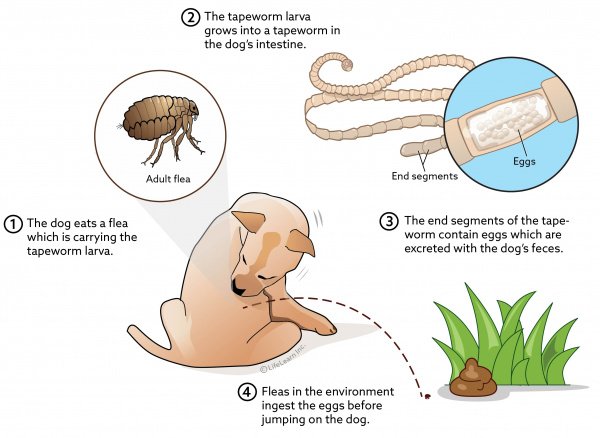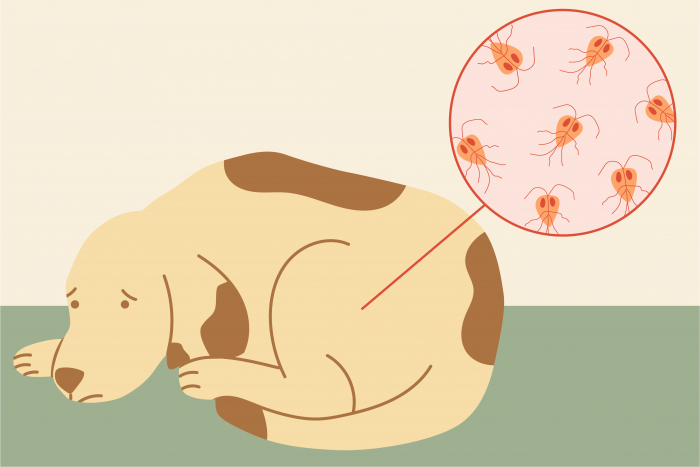Dogs are one of those animals that are at a higher risk of getting an intestinal infection. Worms in dog poop can be a clear indication of the presence of roundworms, tapeworms, or other parasitic worms in your dog’s intestine. Leaving it untreated can cause intestinal inflammation and other severe health concerns.
So, what do worms in dog poop mean, and what should you do about it? Here’s all you need to know.
What Do Worms in Dog Poop Mean?
Table of Contents
Worms in dog poop are a clear sign of parasitic infection in your dog’s intestines. Several parasitic worms, like hookworms, ringworms, roundworms, tapeworms, and whipworms, can live inside a dog’s body. In almost all cases, worms reside in their host’s intestines. Therefore, they often come out along with the poop.
If you see worms in dog poop, contact your veterinarian immediately. There’s no way to get rid of parasitic worms without medical treatment.
How Do Worms Enter a Dog’s Body?
It’s essential to understand how worms enter a dog’s body. With this information at hand, you can take steps to avoid worms from entering your dog’s body.
All parasitic worms thrive in a host’s body, and that’s why they’re called parasitic worms. However, these worms can live outside of a host’s body for months, waiting for their next host.

When outside, they can lay eggs in the mud or garbage. If your dog ingests these eggs, the eggs will hatch, and the worms coming out of them will infect the body.
The most common mode of worm transmission is through dog poop. Animals have a tendency to sniff and even lick open poop. If your dog comes in contact with an infected dog’s poop, it could get the infection.
Fleas play a key role in spreading worms. They often fly over open animal poop and collect eggs. If such fleas enter your home, they can infect your dog.
Symptoms of Worms in Dog Poop
Sometimes, you may not be able to closely monitor your dog poop and whether it has worms. Fortunately, when your dog has worms, it’ll exhibit other symptoms, such as:
- Digestive system issues like diarrhea, abdominal pain, loss of appetite, blood in stool, or intestinal blockage
- Unexplained weight loss
- Pot-bellied appearance
- Lethargy
- Vomiting and dehydration
- pneumonia-like symptoms
- Poor pot appearance
Heartworms are a rare but serious parasitic infection in dogs when heartworms infect a dog’s body. They’re called heartworms because they live in the hearts, lungs, and nearby blood vessels of their host. If left untreated, this condition can be fatal.

Watch out for symptoms like trouble breathing, shortness of breath, exercise intolerance and labored breathing. If you notice these symptoms, rush to your vet immediately.
How Are Worms in Dog Poop Diagnosed?
If the worms are large enough to see with a naked eye, you can diagnose worms yourself. Monitor your dog’s poop and see if there are any worms or eggs. If you don’t see anything and still suspect worms, your vet can help you diagnose the condition. The vet will look at your dog’s poop under the microscope for eggs or small worms.
Treatment for Worms in Dog Poop
The good news is that worms in dogs are easily treatable. Several safe prescription drugs exist that can kill worms inside the body. After the worms die, the body flushes them out through bowel movements.
The drugs used to kill worms are called deworming drugs. Your vet will either give a deworming shot or tablet to your dog. Please note that these drugs dissolve the worms, so they won’t be visible in the poop.
Many times, worms come out with the dog’s poop. However, some worms attach themselves to the intestinal walls. These worms don’t come out with poop and can continue to cause internal damage. Deworming medicines kill these worms, so they can easily come out with poop.
If worms have been residing in your dog’s body for a long time, they can cause damage to other parts of the body and cause inflammation. If your vet finds signs of inflammation, they’ll prescribe anti-inflammatory drugs to your pooch.
What If You Leave Worms Untreated?
You shouldn’t risk leaving worms untreated. Worms aren’t like bacteria that could stay in the body without doing any harm. They are parasites, which means they feed on the host’s body and nutrition. As the worms grow inside your dog’s body, your dog will grow weaker and eventually die.
There are other risk factors associated with worms. If worms lay eggs in the dog’s gut, larvae will come out of them. These larvae can penetrate through the intestines and enter the muscles of the dog. This increases the risks of damage to other organs.
Lastly, these larvae can enter the brain. If that happens, they can quickly kill your dog.
Therefore, if you have the slightest doubt that your dog has worms, get your dog treated immediately.
Is There a Way to Prevent Worms in Dog Poop?
Yes, you can easily prevent worms from entering your dog’s body by taking some easy and effective steps. Here are a few things you can do:
- Since fleas are the leading cause of worms in your dog’s body, do your best to reduce them in your home and backyard. There are various sprays and insecticides you can use to eliminate fleas from your house.
- Always be with your dog when it’s outside. Pay close attention to what it eats, licks, and sniffs. Ensure that your dog stays away from potentially dangerous areas like garbage and the open poop of other animals.
- Always clean your pet after a walk or a play session in the yard.
Conclusion: Worms in Dog Poop
Seeing worms in dog poop can be alarming, but the condition is easily treatable if you get timely treatment. In some cases, worms can cause serious complications, and therefore, it’s essential to reach your vet immediately. The vet will treat your dog using deworming medicines.
So, have you ever seen worms in your dog’s poop?

